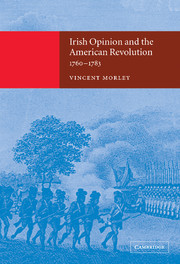4 - Britain defeated, 1781–1783
Published online by Cambridge University Press: 17 July 2009
Summary
As had previously happened after General Burgoyne's defeat at Saratoga, the instinctive reaction of leading patriots in the immediate aftermath of Lord Cornwallis's surrender at Yorktown was to rally around the throne. Barry Yelverton had intended to move a resolution calling for the amendment of Poynings' law on 4 December but instead proposed an address effusive in its expression of loyalty to the crown, the British connection and the empire. In his speech on the occasion he declared that:
We are called upon to testify our affection and unalterable attachment to that country, and to convince foreign nations we do not despair of the commonwealth but that the British empire still has power and resources to render her formidable to her numerous enemies, and to convince them that the dismemberment she has suffered has only served to draw the remaining parts into closer union and interest.
The address was opposed by a minority of opposition members on the grounds that it might encourage government to persist with the American war, but was adopted by the overwhelming margin of 167 votes to 37.
The debate in the House of Commons on the loyal address proposed by Barry Yelverton testifies to the profoundly pro-British outlook of the Anglo-Irish political élite. The address was seconded by Samuel Bradstreet, one of the members for Dublin city and a regular opponent of government measures, who pledged that the Irish opposition would ‘act in a very different manner from what is called the opposition in England’ and called on his fellow patriots to ‘demonstrate by our unanimity in the hour of trial, that in our opposition we have only the good of the empire at heart’.
- Type
- Chapter
- Information
- Irish Opinion and the American Revolution, 1760–1783 , pp. 277 - 329Publisher: Cambridge University PressPrint publication year: 2002

